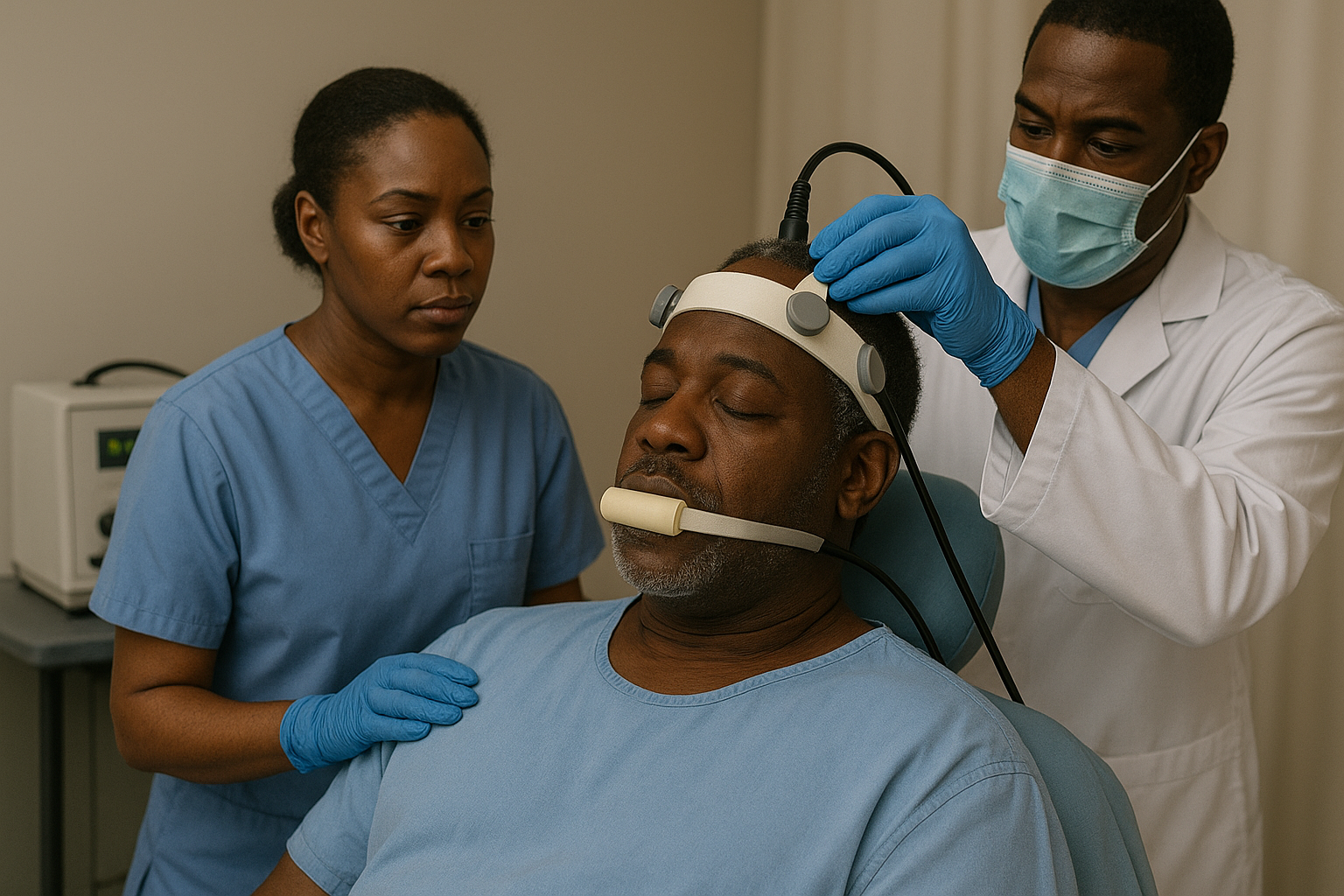Instead, within days, she was told she needed Electroconvulsive Therapy (ECT). Scared but desperate, she agreed.
Weeks later, her memory was patchy, her emotions dulled, and her trust in the system shattered.
Six months later, she still struggled with memory lapses and other lingering side effects, confusion, fatigue, and emotional numbness.
Worst of all, she realized the procedure hadn’t provided any lasting relief from her depression; the pain had only gone quiet for a while. Furaha’s story isn’t isolated.
Across many Kenyan hospitals offering mental health services, ECT, once considered a last-resort treatment, is increasingly used as a quick fix or, worse, a business tool.
This article explores how hospitals are turning therapy into a transaction and why mental health should never be about profit.
What is ECT, and When Should it Be Used?
Most people imagine Electroconvulsive Therapy (ECT) as something out of an old movie: harsh, painful, and outdated.
While modern ECT is said to be “safer” and done under anesthesia, it still involves sending electrical currents through the brain to trigger a seizure.
For some patients with severe, treatment-resistant depression, it can offer temporary relief. But that's the keyword, temporary.
In clinical settings, ECT was meant to be used only when other treatments have failed, not as a first-line response.
Some experts and survivors of the procedure say that the side effects, including brain damage from this procedure, is not even worth using it for such patients.
Regardless of the various views, all international standard guidelines are clear that ECT should be reserved for very severe depression, severe mania, and severe schizophrenia that haven’t responded to at least two different medications, or in emergency situations where someone is actively suicidal or catatonic.
Yet many hospitals skip the basics, therapy, medication adjustments, or lifestyle interventions, and rush patients toward it. Often, patients are told:
- "This will work faster than therapy."
- "You've tried enough; let's move to ECT."
- "It's completely safe now."
- “The side effects are not as bad as you may think.”
But without full disclosure about the risks and alternatives, informed consent becomes an illusion, and healing turns into harm disguised as help.
You deserve to know that while ECT may provide rapid symptom relief with noticeable side effects, maintenance treatments are almost always required, meaning the procedure becomes an ongoing commitment to have your brain shocked regularly rather than a one-time fix.
The Alarming Trend: How Some Kenyan Hospitals Are Misusing ECT
In recent years, ECT has quietly shifted from a rare intervention to a profitable hospital procedure.
Behind the sterile walls of mental health facilities, business interests often overshadow ethics.
Hospitals earn significant revenue per ECT session, and some capitalize on patients' desperation for quick relief.
When you're vulnerable and seeking help, you may not realize that financial incentives could be influencing your treatment plan. The troubling signs of misuse include:
- Rushed recommendations — patients are advised to undergo ECT within hours or days of admission.
- Lack of informed consent — families are not told about potential side effects or alternatives.
- Overprescription — patients who could benefit from therapy or medication are prescribed this method.
- Repeat sessions — hospitals encourage ongoing treatments to sustain income.
When care turns commercial, vulnerable patients become victims of a system that markets treatment as a product, not a process of recovery. \
You should be aware that some facilities in some countries have been investigated or studied (Kenyan study) for performing ECT on patients who never received adequate trials of standard treatments first.
This isn't about demonizing a legitimate medical intervention, it's about ensuring you receive ethical, patient-centered care rather than becoming a revenue stream.
The following documentary shows the depth ECT goes into and how the side effects can be severe without lasting positive change from the procedure. Viewer discretion is advised in some parts.
The Human Cost: Emotional, Cognitive, and Ethical Consequences
Behind the statistics are real people, individuals whose sense of self fades with each session.
When you undergo ECT, you're not just risking a headache or temporary confusion; you're potentially altering the very fabric of who you are.
Studies show that 29-55% of patients experience persistent memory problems, and some report losing entire chapters of their lives.
The table below shows the common adverse effects of ECT, comparing how they often appear in the short term versus long term:
| Adverse Effect | Short-Term Impact | Long-Term Impact |
| Memory Loss | Forgetting recent events or conversations | Persistent gaps in autobiographical memory (months or years missing) |
| Confusion | Disorientation immediately after sessions | Ongoing difficulty focusing or recalling details |
| Emotional Flatness | Reduced emotional responsiveness | Long-term emotional numbness or detachment |
| Physical Fatigue | Headaches, dizziness, or weakness | Chronic tiredness and reduced mental clarity |
| Anxiety or Fear | Nervousness before or after treatment | Deepened mistrust in the healthcare system |
You might struggle to recognize your own handwriting, forget skills you once mastered, or feel emotionally disconnected from your own children.
When healing robs you of memory, emotion, and autonomy, it ceases to be treatment; it becomes trauma disguised as medicine.
The ethical cost is equally devastating: when you can't remember consenting to future treatments, how can ongoing consent be valid?
What Should Come Before ECT: Safer and More Effective Alternatives
Before electricity touches your brain, you deserve a full exploration of other paths to healing.
Mental health recovery is not instant; it's layered, requiring time, trust, and compassion.
Evidence shows that most cases of depression and anxiety respond well to non-invasive methods, and research indicates that comprehensive treatment approaches achieve remission rates comparable to ECT without the cognitive risks.
The methods you should explore first include:
- Psychotherapy — including CBT, trauma-focused therapy, and EMDR, to help reframe negative thought patterns.
- Medication management — under psychiatric supervision, with regular reviews to adjust dosages or combinations.
- Lifestyle changes — exercise, nutrition, and adequate sleep improve brain function and mood stability.
- Support systems — family therapy, group counseling, and peer networks help reduce isolation.
Therapy may not be as dramatic or fast, but it allows your brain and heart to recover without harm.
You have the right to ask your doctor: "What else haven't we tried? What are the success rates of those alternatives compared to ECT?"
If you're being rushed toward ECT, that alone should be a red flag prompting you to seek a second opinion.
Calling for Accountability and Reform in Mental Health Care in Kenya

It's time to challenge how ECT is being used and misused. Mental health care should never be driven by profit, but by compassion and ethics.
When you walk into a hospital seeking help, you should be met with transparency, not sales pitches disguised as medical advice.
Patients deserve the right to ask questions, understand the risks, and make truly informed choices.
To restore integrity in psychiatric care, we must push for:
- Stricter regulation of ECT use, ensuring it remains a last-resort treatment.
- Transparent reporting of outcomes and side effects.
- Mandatory psychological evaluations before any ECT recommendation.
- Public awareness campaigns to educate families on safer alternatives.
Yet too often, the power dynamic between doctor and patient silences your voice, making you feel that questioning treatment means you're not "serious" about recovery.
This must change.
You have every right to demand evidence, seek second opinions, and refuse treatments that don't align with your values and understanding of the risks involved.
When you share your story, when you question protocols, when you demand better, you become part of a movement that values human dignity over hospital dividends.
Ultimately, healing begins with honesty. If Kenyan hospitals continue to use ECT as a shortcut to income, we risk betraying the very people mental health care is meant to protect.
It's time to choose humanity over haste, and mental health over money. You deserve care that honors your mind, not erases it.
Be Vigilant When Seeking Mental Health Care in Kenya
Before considering ECT, we urge you to explore comprehensive therapy options first.
At WellSawa Mind Solutions, we provide accessible, professional mental health support that prioritizes your cognitive safety and emotional wellbeing without the risks associated with invasive procedures.
- Have all medication combinations been tried?
- Have you completed at least 12 weeks of evidence-based therapy?
- What are the documented success rates versus memory loss rates at this or other facilities?

